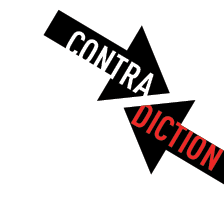

About the Weissbourd Conference
The Weissbourd Annual Conference, organized by the University of Chicago Society of Fellows, brings together scholars from across the humanities and social sciences to present their work in the context of a shared critical problem, debate, or paradigm. This year's conference, scheduled for May 6-7, 2011, focuses on the topic of "Contradiction."
An inevitable term in virtually all areas of critical analysis, "contradiction" describes a fraught relationship between established categories of thought. Variously signaling a logical impossibility or impasse, an opposing claim or negation, or literally, an act of "speaking against" or speaking otherwise, the notion of contradiction opens up a path toward interdisciplinary examination of the foundations of critical inquiry itself. How does contradiction shape the central problems we address in fields as distinct as history, philosophy, literary and cultural criticism, poetics, politics, psychology, theology, and law? What is the relationship between such apparently static oppositions as nature/artifice or sacred/profane and dynamic understandings of contradiction such as dialectics? What forms of coherence and consistency are required for critiques of scientific theories, of artworks and aesthetic practices, of speech acts and texts, or of social and political ideologies? How do we live with contradiction, in theory and in practice? And can we live without it?
John R. Searle, Slusser Professor of Philosophy at the University of California, Berkeley, will deliver the keynote address at this year's conference. Robert Pippin, Evelyn Stefansson Nef Distinguished Service Professor of Social Thought and Philosophy at the University of Chicago, will offer a response. Along with these talks, the conference will comprise a series of interdisciplinary panels chaired by faculty, fellows, and visiting scholars.
This conference was made possible by the generous support of the Bernard Weissbourd Memorial Fund. Bernard (Barney) Weissbourd enjoyed a lifelong connection with the University of Chicago, beginning at age 15 when he received a full scholarship to attend the College. In these first years, Weissbourd was captivated by the University's intellectual life, his concentration in chemistry, and especially his study of the classics—a staple of the curriculum in the Hutchins era. When he graduated in 1941, he entered the law school. WWII interrupted his studies, but he remained at the University, having been assigned to work on the Manhattan Project, where he contributed to the discovery of an element. At the war’s end, he returned to the law school and became an editor of the Law Review before graduating in 1948. He served the University as an active member of the Board of Trustees and as Trustee Emeritus until his death in 2000 at the age of 78.
Weissbourd was a scientist, attorney, urban planner, and a developer who had a dramatic impact on the skyline and the life of Chicago. He maintained a lifelong interest in civic affairs, working on issues ranging from race and poverty to nuclear arms. His interest in the relationship between human psychology and social institutions led him to found the Center for Psycho-Social Studies in the early 1970’s. The Center became an important location for interdisciplinary dialogue, intellectual exploration, and the nurturing of promising young scholars.
The Bernard Weissbourd Memorial Fund for the Society of Fellows pays tribute to Barney Weissbourd’s history of involvement with the University. The Fund reflects his abiding commitments to spirited inquiry, the excitement of learning, the power of discourse, and through all of these, the pursuit of a more just and humane society.
The organizers would like to express our gratitude to the Weissbourd family and to our co-sponsors for this year's conference, the Nicholson Center for British Studies and the Philosophy Department at the University of Chicago, with special thanks to Robert Pippin and James Conant, as well as to Bradin Cormack, Kristin Lueke, and Valerie Wallace. Many thanks also to Dean of the College John Boyer and to our colleagues in the Society of Fellows, especially Faculty Chair Chris Faraone, Vice Faculty Chair Bertram Cohler, and David Bevington, and Junior Faculty Co-Chairs Katie Chenoweth and Andrew Dilts. Special thanks to Julia Klein, Program Coordinator for the Society of Fellows, for all her support and assistance throughout the year.
- Dina Gusejnova & Emily Steinlight
Weissbourd 2010-2011 Events Series Co-Chairs